If you experience itchy arms, legs, or face, it may be due to a variety of factors. Some of these may only cause itching in specific areas, while others can cause itchiness from head to toe, so determining the source of your itching is critical to getting the relief you require. Dry, itchy skin can be uncomfortable and irritating, but there are several steps you can take to relieve these symptoms. As a dermatologist, here are some of my top recommendations:
- Moisturize regularly: Using a moisturizer is essential for keeping the skin hydrated and preventing dryness. Look for a moisturizer that is rich in emollients and humectants such as glycerin, urea, or hyaluronic acid. Apply it immediately after showering or bathing to lock in moisture.
-
Use a gentle cleanser: Avoid using harsh soaps or cleansers that can strip the skin of its natural oils. Instead, use a gentle, fragrance-free cleanser that is formulated for sensitive skin.
-
Take shorter, cooler showers: Hot water can dry out the skin and worsen itching. Take shorter showers using cooler water to help prevent further dehydration of the skin.
-
Apply a cool compress: If your skin is particularly itchy, applying a cool compress or damp cloth to the affected area can help to relieve the itchiness.
-
Avoid wearing tight-fitting clothing: Tight clothing can irritate the skin and worsen itching. Wear loose, breathable clothing made from natural fibers such as cotton.
-
Use a humidifier: Dry indoor air can worsen skin dryness and itchiness. Using a humidifier can help to add moisture to the air, which can alleviate these symptoms.
If your dry, itchy skin persists despite these measures, or if you develop other symptoms such as redness or rash, it's important to see a dermatologist for further evaluation and treatment.
What causes itchy skin
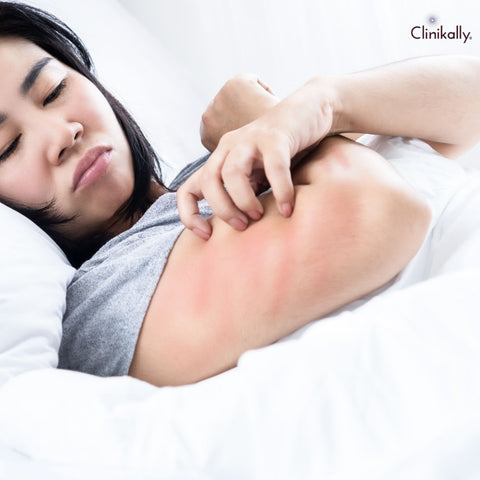
There are many potential causes of itchy skin, including:
-
Dry skin: When the skin becomes dry, it can cause itching. This is a common cause of winter itch, which is more prevalent in cold and dry weather.
-
Allergic reactions: Allergic reactions to certain substances, such as insect bites, chemicals, or certain foods, can cause itching.
-
Eczema: Eczema is a chronic skin condition characterized by itchy, dry, and inflamed skin.
-
Psoriasis: Psoriasis is an autoimmune disease that causes red, scaly patches on the skin, which can be itchy.
-
Medications: Some medications can cause itchy skin as a side effect.
-
Infections: Certain bacterial, viral, or fungal infections can cause itchy skin.
-
Parasites: Parasites such as scabies, lice, and bed bugs can cause intense itching.
- Hormonal changes: Hormonal changes during pregnancy or menopause can cause itching.
-
Stress: Stress can trigger or exacerbate itching.
If you are experiencing persistent or severe itching, it is important to see a doctor to determine the underlying cause and receive appropriate treatment.
The impact of weather on skin conditions
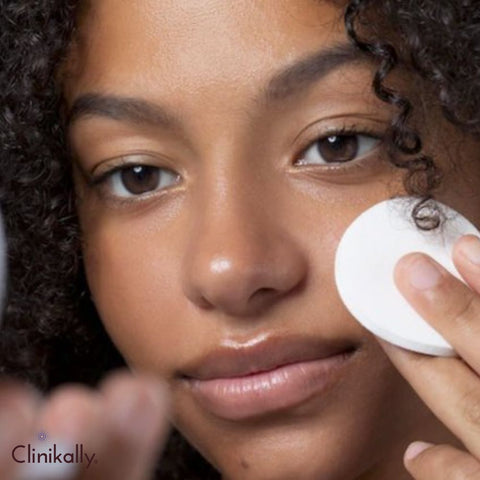
Weather can have a significant impact on many skin conditions. Here's how it is done:
-
Dry Weather: Low humidity, which is common in cold climates or during the winter, can cause dry skin. This can aggravate conditions like eczema and psoriasis, resulting in itching, flakiness, and irritation.
-
Hot Weather: High temperatures and humidity can cause sweating, which can clog pores and cause acne breakouts. It can also worsen conditions such as rosacea, causing flushing and redness.
-
Sun Exposure: UV radiation from the sun can exacerbate skin conditions like eczema, psoriasis, and rosacea. It may also cause sunburn and raise the risk of skin cancer.
-
Cold Weather: The loss of moisture in the skin due to low temperatures can result in dryness and chapping, especially on exposed skin areas like the hands and face. This has the potential to worsen dermatitis and eczema.
-
Allergens: Variations in the weather can increase the amount of mould, pollen, and other allergens, which can cause allergic reactions in certain people. This may show up as hives, itching, or a worsening of skin disorders like eczema.
-
Wind: Dryness and irritation can result from the skin's natural oils being removed by windy conditions. Windburn can cause redness and discomfort, especially on delicate areas like the face.
-
Humidity: Excessive sweating brought on by high humidity can exacerbate fungal infections and acne. On the other hand, low humidity can cause dryness and exacerbate conditions like eczema and psoriasis.
Clothing materials and skin irritation
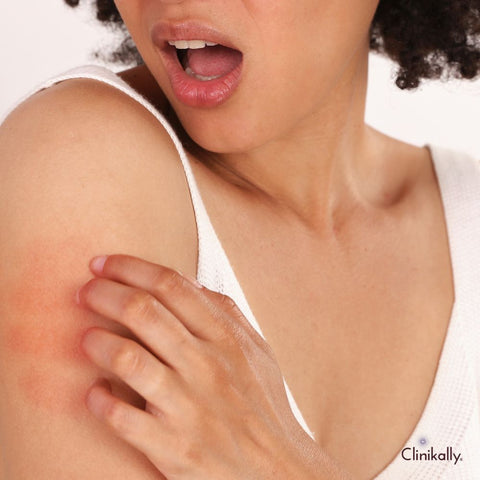
The choice of clothing material can have an impact on skin irritation, particularly for people with sensitive skin or certain skin conditions. Here's how different materials affect the skin:
-
Cotton: Cotton is a naturally breathable fabric that is generally gentle on the skin. It allows air to circulate, which reduces the risk of irritation and increases comfort. Cotton is commonly recommended for people with sensitive skin or eczema.
-
Silk: Silk is another natural fabric that feels soft and smooth on the skin. It has hypoallergenic properties, which means it will cause fewer allergic reactions or irritations. Silk can be an excellent choice for people with sensitive skin or dermatitis.
-
Bamboo: Bamboo fabric is known for its softness and moisture-wicking properties, making it ideal for people who sweat a lot or live in hot climates. It is often regarded as a more sustainable and environmentally friendly alternative to cotton.
-
Synthetic Fabrics (Polyester, Nylon, etc.): Especially in warm and muggy weather, synthetic fabrics can trap moisture against the skin and cause perspiration and irritation because they are less breathable than natural fibres. They might also rub up against the skin, causing chafing and other discomfort.
-
Wool: Although insulating and warm, wool can irritate some people, particularly those with eczema or other sensitive skin conditions. Wool contains a natural oil called lanolin, to which some people may be allergic. Coarser wool fibres can also scratch and itch.
-
Blended Fabrics: A lot of clothes are composed of mixtures of various materials, like polyester and cotton. The proportion of materials used can affect these fabrics' characteristics. A balance between breathability, durability, and comfort may be provided by blended fabrics.
-
Dyes and Chemical Treatments: In addition to the fabric itself, skin irritation may also be caused by dyes and chemical treatments applied during the manufacturing process. Choosing clothing free of harsh chemicals or labelled as hypoallergenic can help lower the chance of irritation.
Allergy testing for itchy skin causes
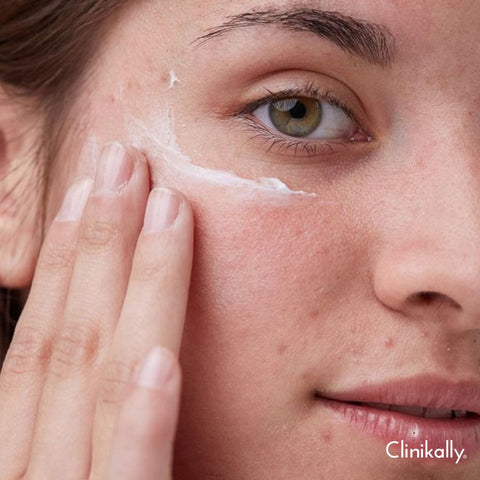
Allergy testing can help identify the underlying causes of itchy skin. Here are some common allergy testing methods for itchy skin:
-
This is among the most common allergy tests. Small amounts of common allergens are applied to the skin, typically on the forearm or back. The skin is then pricked with a small needle to allow the allergen to enter. If you are allergic to a specific substance, you will usually notice a raised bump or hive at the site within 15-20 minutes.
-
Patch testing is commonly used to diagnose allergic contact dermatitis, a type of eczema triggered by exposure to specific allergens or irritants. Small patches containing different allergens are applied to the skin, typically on the back. The patches are left on for approximately 48 hours before the skin is examined for any reactions.
-
Blood tests, such as the specific IgE test, detect the presence of allergy-related antibodies (IgE) in the blood. This can aid in determining allergies to specific substances, such as pollen, dust mites, pet dander, or certain foods. However, blood tests may not always accurately reflect skin reactions.
-
Intradermal testing involves injecting allergens under the skin, usually on the forearm. This test is more sensitive than skin prick testing, but it also has a higher likelihood of producing false positive results.
-
For itchy skin caused by food allergies or sensitivities, an elimination diet may be advised. This entails temporarily removing suspected trigger foods from your diet before gradually reintroducing them while monitoring for symptoms.
-
In some cases, a skin biopsy may be used to diagnose underlying skin conditions that are causing itching. A skin biopsy involves removing a small sample of skin and examining it under a microscope.
Before undergoing allergy testing, you should consult with a healthcare professional, such as an allergist or dermatologist, who will assess your symptoms and medical history to determine the best testing method. They can also help you prepare for the tests and interpret the results.
Treatment for itchy skin
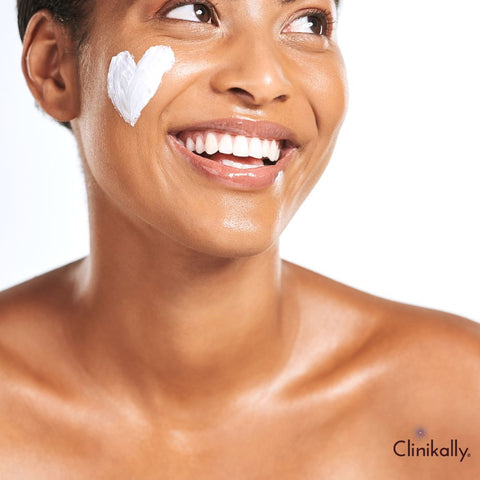
A cream or lotion containing hydrocortisone or pramoxine hydrochloride is one itchy skin treatment option, in addition to avoiding triggers. These ingredients provide temporary itch relief, which helps prevent scratching, which can break the skin and lead to infection. Moisturizer is beneficial for hydration and can help you avoid the itching associated with dry skin. The treatment for itchy skin will depend on the underlying cause of the itchiness. Here are some general steps that can be taken to relieve mild to moderate cases of itchy skin:
-
Moisturize your skin: Use a fragrance-free moisturizer to help relieve dry skin that may be causing the itchiness. Apply it after showering or bathing when your skin is still slightly damp.
-
Avoid hot showers or baths: Hot water can dry out your skin and make it itchier. Stick to lukewarm water instead.
-
Wear loose-fitting clothing: Tight-fitting clothing can rub against your skin and make it itchier. Wear loose-fitting clothing made from natural fibres such as cotton or silk.
-
Take cool baths with colloidal oatmeal: Soaking in a cool bath with colloidal oatmeal can help relieve itching caused by dry skin, eczema, or insect bites.
-
Apply a topical cream: Over-the-counter topical creams, such as hydrocortisone, calamine lotion, or antihistamine creams, can help relieve itching caused by insect bites, rashes, or allergic reactions.
-
Avoid scratching: Scratching can make the itch worse and can lead to skin damage and infection.
If your itchy skin persists or is severe, it is best to consult a doctor who can help identify the underlying cause and recommend the appropriate treatment.
Antihistamines for skin itch relief
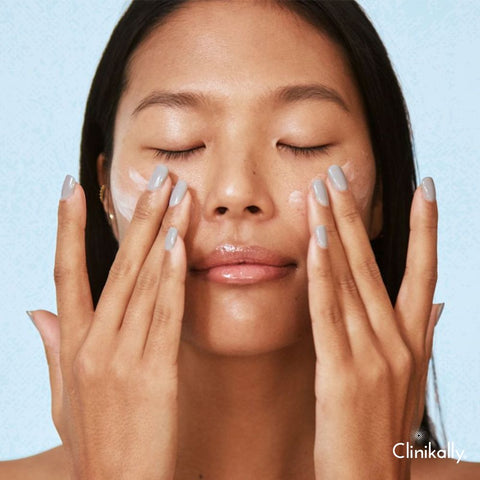
Antihistamines are frequently used to reduce itching brought on by allergies, reactions, and a variety of skin conditions. Here is how they function and some usage advice:
-
The body's immune system releases histamines in reaction to allergens or irritants. They produce other allergic symptoms, such as inflammation and itching. Antihistamines lessen itching and other allergic reactions by inhibiting the effects of histamine.
-
Medications like diphenhydramine (Benadryl), chlorpheniramine (Chlor-Trimeton), and hydroxyzine (Atarax) are examples of first-generation antihistamines. They tend to cause drowsiness and may be more effective for acute itching but can also cause more side effects. Medications like loratadine (Claritin), cetirizine (Zyrtec), and fexofenadine (Allegra) are examples of second-generation antihistamines. They are less likely to cause drowsiness and are often preferred for long-term use.
-
There are many different forms of antihistamines, such as tablets, capsules, liquids, and creams. The particular medication, the patient's age, weight, and health condition all affect the dosage and frequency of administration. Always heed the directions on the medication label or from your healthcare provider.
-
Common antihistamine side effects include drowsiness, dizziness, dry mouth, and blurred vision, especially with first-generation medications. Second-generation antihistamines are generally less sedative, but they can still cause mild side effects in some people.
-
Before using antihistamines to relieve itching, consult with a healthcare professional, especially if you have underlying medical conditions, are taking other medications, are pregnant or breastfeeding, or are concerned about potential interactions or side effects. Furthermore, antihistamines may not be effective for all types of itching, so any underlying causes or conditions should be addressed with appropriate medical care.
Topical steroids for itchy skin relief
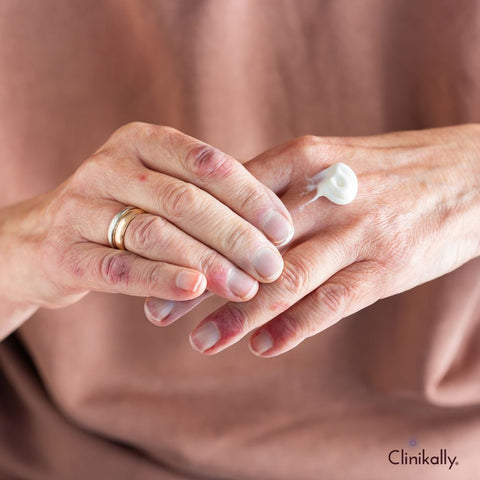
Topical steroids are widely used to treat a variety of skin conditions that cause inflammation and itching. They are also referred to as corticosteroids or cortisone creams. Here's how they work and some tips for using them:
-
Mechanism of action: Topical steroids reduce inflammation and suppress the immune response in the skin. They inhibit the production of inflammatory substances and decrease the activity of immune cells that cause itching and irritation.
-
Types of Topical Steroids: Topical steroids come in a range of formulations and strengths, from mild to strong. Depending on the particular ailment being treated and the patient's preferences, they may be prescribed as creams, ointments, lotions, gels, or foams.
-
Indications: Topical steroids are used to treat several skin conditions that cause itching, inflammation, and redness, including rashes, eczema (atopic dermatitis), psoriasis, allergic reactions, contact dermatitis, and insect bites.
-
Dosage and Administration: Depending on the location of the affected area, the severity of the condition, and other factors, the right strength and frequency of application will be determined. It is critical to use the medication as prescribed by your healthcare provider and to adhere to their instructions. Topical steroids can cause side effects like skin thinning, stretch marks, and increased susceptibility to infections if they are used excessively or for an extended period.
-
Precautions and Considerations: It is important to speak with a healthcare provider before using topical steroids, particularly if you have a history of allergies, skin sensitivity, or other medical conditions. They can offer advice on how to take the drug safely and effectively as well as assist in determining the right steroid strength and formulation for your unique requirements. It is also imperative to wait for a doctor's approval before using topical steroids on broken or infected skin.
-
Gradual Withdrawal: It is crucial to taper off topical steroids gradually to prevent rebound symptoms and withdrawal effects after extended use. Your doctor can offer advice on how to safely cut back on the dosage and frequency of your medication.
If used properly and under medical supervision, topical steroids can be very helpful in reducing inflammation and itching related to a variety of skin conditions. They must, however, be used sparingly and in conjunction with a thorough treatment strategy that deals with the underlying source of the itching.
Bath remedies for itchy skin
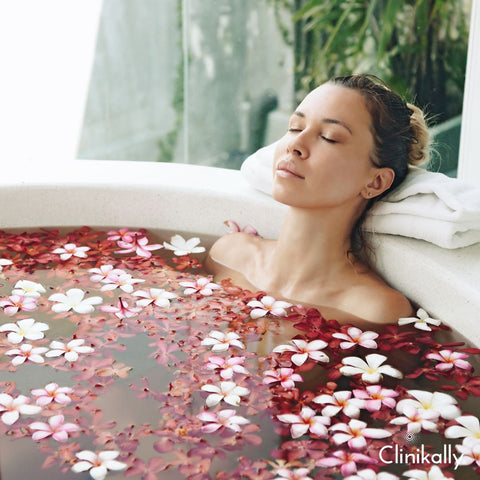
Baths can soothe and relieve itchy skin, especially when combined with specific additives or remedies. Here are some bath remedies to help relieve itching:
-
Oatmeal Bath: Oatmeal has anti-inflammatory properties, making it an excellent remedy for itchy skin. To make an oatmeal bath, finely grind one cup of plain, unflavored oatmeal and place it in a bathtub filled with warm water. Soak in the oatmeal bath for 15-20 minutes, then gently rub the oatmeal-soaked water onto the itchy areas of your skin.
-
Baking Soda Bath: Baking soda can reduce itching and inflammation by balancing the pH of the skin. Soak in a bathtub full of warm water for 15-20 minutes with one cup of baking soda. After a bath, pat your skin dry and avoid rubbing it vigorously.
-
Apple Cider Vinegar Bath: Apple cider vinegar has anti-inflammatory properties that can help with itchy skin. In a bathtub filled with warm water, add one to two cups of raw, unfiltered apple cider vinegar and soak for 15-20 minutes. Be careful not to use too much vinegar, as it can irritate some people.
-
Epsom Salt Bath: Epsom salt, also known as magnesium sulphate, can help reduce inflammation and itching. Add one to two cups of Epsom salt to a warm bathtub and soak for 15-20 minutes. Epsom salt contains magnesium, which is thought to promote relaxation and stress relief.
-
Coconut Oil Bath: Coconut oil, a natural moisturiser with anti-inflammatory properties, can help relieve itchy skin. In a bathtub filled with warm water, add a few tablespoons of melted coconut oil and soak for 15-20 minutes. After taking a bath, pat your skin dry to seal in moisture.
-
Herbal Baths: Adding chamomile, lavender, or calendula to your bathwater can provide additional soothing and anti-inflammatory properties. You can use fresh or dried herbs, or buy pre-made herbal bath blends at health food stores.
-
Aveeno Bath Products: Aveeno's oat-based bath products are specifically designed to soothe itchy, irritated skin. Their oatmeal bath packets or bath treatments can be mixed into warm water to provide soothing relief.
Before using any bath remedy for itchy skin, test it on a small patch of skin to ensure there is no allergic reaction or irritation. In addition, if you have any underlying skin conditions or concerns, you should consult with a healthcare professional before trying any new bath remedies.
Home remedies for itchy skin
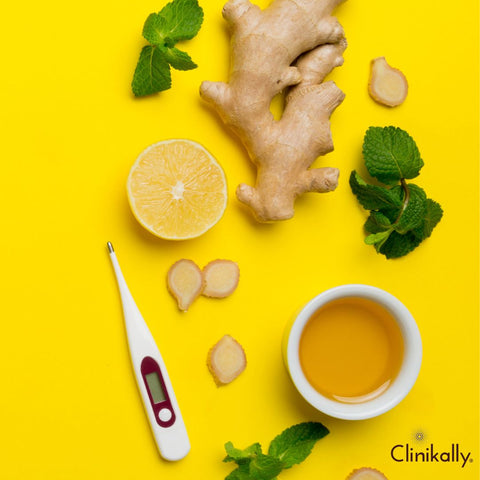
There are several home remedies that can help soothe itchy skin. Here are some options:
-
Oatmeal bath: Add colloidal oatmeal (finely ground oatmeal) to a warm bath and soak for 15-20 minutes. Oatmeal contains compounds that can help calm inflamed skin.
-
Aloe vera: Apply pure aloe vera gel to the itchy area. Aloe vera contains anti-inflammatory compounds that can help reduce itching.
-
Coconut oil: Apply pure coconut oil to the itchy area. Coconut oil is a natural moisturizer that can help soothe dry, itchy skin.
-
Baking soda: Add baking soda to a warm bath and soak for 15-20 minutes. Baking soda can help relieve itching and soothe skin.
-
Apple cider vinegar: Mix equal parts apple cider vinegar and water and apply to the itchy area with a cotton ball. Apple cider vinegar can help relieve itching and inflammation.
-
Cold compress: Apply a cold, damp cloth to the itchy area. Cold can help numb the skin and relieve itching.
-
Tea tree oil: Dilute tea tree oil with carrier oil, such as coconut oil, and apply to the itchy area. Tea tree oil has anti-inflammatory and antimicrobial properties that can help soothe skin.
It's important to note that if your itching is severe or accompanied by other symptoms, such as a rash or fever, you should see a doctor.
Natural oils for itchy skin relief
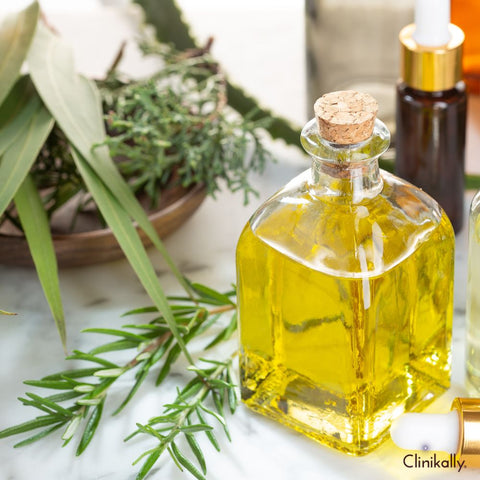
Natural oils can help relieve itchy skin because of their moisturising and soothing properties. Here are some natural oils that are frequently used for this purpose:
-
Coconut Oil: Coconut oil is high in fatty acids and has anti-inflammatory properties. It moisturises the skin and creates a protective barrier against moisture loss. Apply virgin or extra virgin coconut oil to itchy skin and gently massage until absorbed.
-
Olive Oil: Olive oil is another great moisturiser for relieving itching and dryness. It contains antioxidants and anti-inflammatory compounds that relieve irritated skin. Apply and gently massage extra virgin olive oil into the affected areas.
-
Jojoba Oil: Jojoba oil closely resembles the skin's natural oils, making it an excellent moisturiser for all skin types. It regulates oil production and relieves dry, itchy skin. Apply jojoba oil to the itchy areas and massage gently.
-
Sweet Almond Oil: Sweet almond oil contains vitamins E and A, which nourish and moisturise the skin. It has anti-inflammatory properties that can help relieve itching and irritation. Apply sweet almond oil to the itchy areas and gently massage.
-
Sunflower Oil: Sunflower oil contains a lot of linoleic acid, which keeps the skin's moisture barrier intact. Its anti-inflammatory qualities may assist in reducing redness and itching. Directly apply and gently massage sunflower oil onto the irritated areas.
-
Argan Oil: Packed full of fatty acids, antioxidants, and vitamin E, argan oil is a great moisturiser for dry, irritated skin. It relieves irritation and aids in skin barrier repair. Apply and gently massage argan oil into the affected areas.
-
Calendula Oil: Calendula oil, derived from marigold flowers, is anti-inflammatory and antimicrobial, which can help relieve itching and promote healing. It is especially useful for sensitive or irritated skin. Apply calendula oil to the itchy areas and gently massage.
When using natural oils to treat itchy skin, make sure to use high-quality, cold-pressed oils with no added fragrances or chemicals. Before using any new oil, perform a patch test on a small area of skin to ensure no allergic reaction occurs. If you have any underlying skin conditions or concerns, speak with a doctor before using natural oils for itch relief.
The benefits of aloe vera for skin
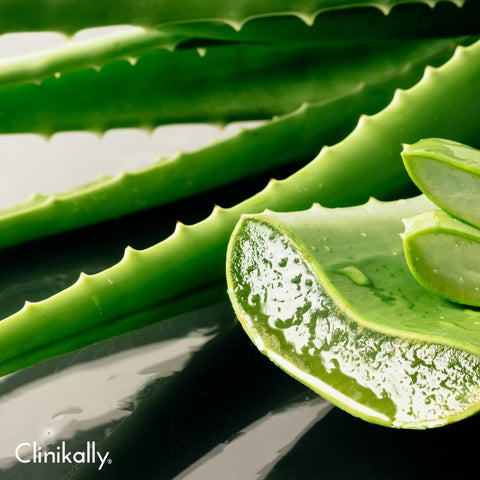
Aloe vera is a well-known plant that provides numerous skin health benefits. Here are some of the main advantages of using aloe vera on the skin:
-
Moisturising: Aloe vera gel is high in water and contains polysaccharides, which help hydrate and moisturise the skin. It forms a protective barrier against moisture loss and keeps the skin hydrated.
-
Soothing: Aloe vera's natural anti-inflammatory properties can soothe and calm irritated or inflamed skin. It is commonly used to treat sunburn, minor burns, and skin irritations like itching and redness.
-
Healing: Aloe vera contains a variety of compounds, including vitamins, minerals, amino acids, and enzymes, that aid in skin regeneration and healing. It can speed up the healing process for minor cuts, abrasions, and wounds.
-
Anti-aging: Aloe vera contains antioxidants like vitamins C and E, which protect the skin from free radicals. Regular use of aloe vera can help to reduce the appearance of fine lines, wrinkles, and other signs of ageing.
-
Acne treatment: Aloe vera has antibacterial and anti-inflammatory properties that can help with acne breakouts and inflammation. It can also help to soothe acne-prone skin and minimise the appearance of acne scars.
-
Skin lightening: Aloe vera contains compounds that inhibit the production of melanin, the pigment that determines skin colour. Regular use of aloe vera gel can help to lighten dark spots, hyperpigmentation, and blemishes, resulting in a more even skin tone.
-
Skin conditions: Eczema, psoriasis, and dermatitis are among the skin conditions that aloe vera helps to treat. Its moisturising and anti-inflammatory properties can alleviate itching, redness, and discomfort caused by these conditions.
-
Hair and scalp health: Aloe vera benefits not only the skin, but also the hair and scalp. Use it topically or in hair care products to help hydrate the scalp, lessen dandruff, and encourage healthy growth of new hair.
Moisturizing techniques for dry skin
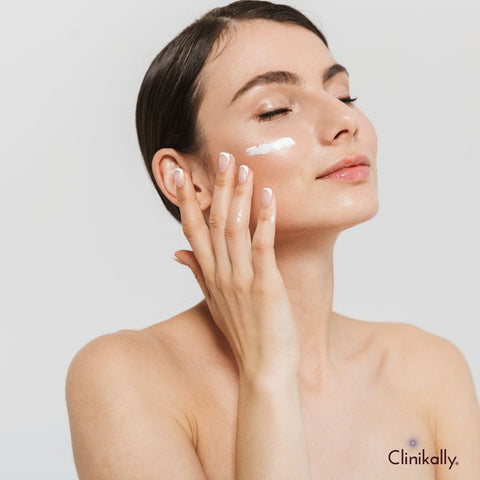
Moisturising is vital for treating dry skin and keeping it healthy and attractive. Some effective moisturising strategies for dry skin include selecting the proper moisturiser, applying it after bathing, using humidifiers, avoiding hot water, exfoliating gently, using sunscreen, drinking enough water, limiting exposure to harsh chemicals, and protecting your skin. By adding these moisturising strategies to your regular skincare regimen, you may effectively manage dry skin while keeping it moisturised, smooth, and healthy. If you have severe or persistent dry skin, speak with a dermatologist for personalised advice and treatment options.
Diet and skin health

Diet has a significant impact on skin health because the foods you eat can change the appearance, texture, and overall condition. Here's how different dietary factors can influence skin health:
-
Hydration: Proper hydration is essential for healthy, glowing skin. Drinking plenty of water keeps your skin hydrated from the inside out, reducing dryness and promoting a plump, youthful appearance.
-
Antioxidants: Foods high in antioxidants, like fruits, vegetables, nuts, seeds, and green tea, can shield your skin from UV rays, free radicals, and environmental stressors. By preventing oxidative stress and lowering the risk of premature ageing, wrinkles, and skin damage, antioxidants help neutralise free radicals.
-
Omega-3 Fatty Acids: Flaxseeds, chia seeds, walnuts, and fatty fish like salmon, sardines, and mackerel are rich sources of omega-3 fatty acids, which are critical for keeping skin healthy. Omega-3 fatty acids keep the skin hydrated, supple, and resilient by supporting the lipid barrier of the skin.
-
Minerals and vitamins: A few specific minerals and vitamins are essential for healthy skin. Vitamin C brightens the skin, helps heal wounds, and increases the production of collagen. It can be found in citrus fruits, berries, and leafy greens. Nuts, seeds, and vegetable oils contain vitamin E, a potent antioxidant that helps to repair and shield skin from harm. Zinc, which is present in beans, chicken, and oysters, helps control the production of oil, lessen inflammation, and accelerate skin healing.
-
Protein: Collagen, elastin fibres, and skin cells all depend on protein for growth and repair. Include lean protein sources in your diet, such as poultry, fish, tofu, legumes, and Greek yoghurt, to improve skin health and elasticity.
-
Healthy Fats: Avocados, olive oil, nuts, and seeds contain monounsaturated and polyunsaturated fats, which help to maintain the skin's lipid barrier, keeping it hydrated and supple. Incorporate these healthy fats into your diet to improve skin health and reduce inflammation.
-
Probiotics: Probiotics are good bacteria that help maintain gut health and may help treat skin disorders like rosacea, eczema, and acne. Fermented foods, such as kimchi, kefir, yoghurt, and sauerkraut, are high in probiotics and can support a balanced population of gut bacteria, which may have positive effects on the skin.
-
Reduce Your Consumption of Sugar and Processed Foods: These foods can aggravate inflammation, cause insulin spikes, and glycation, all of which can harm your skin and cause problems like wrinkles, acne, and early ageing. Reduce your intake of sugary snacks, processed foods, and refined carbohydrates, and instead opt for whole, nutrient-rich foods.
You can support skin health from the inside out by eating a well-balanced diet rich in hydrating foods, antioxidants, healthy fats, vitamins, and minerals. Maintaining a healthy lifestyle, getting regular exercise, managing stress, and getting enough sleep are all important aspects of overall skin health.
Stress management for skin health
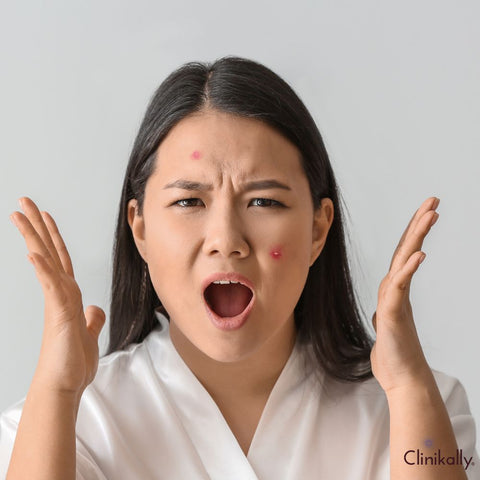
Stress management is essential for skin health because chronic stress can harm your skin's appearance, texture, and overall condition. Here are some stress management techniques that can help with skin health:
-
Practice Relaxation Techniques: To promote relaxation and reduce stress, try deep breathing exercises, meditation, progressive muscle relaxation, or guided imagery. These techniques can help to relax the mind, lower cortisol levels, and treat stress-related skin issues.
-
Exercise regularly: Regular physical activity can help reduce stress, improve mood, and promote overall health. Aim for at least 30 minutes of moderate-intensity exercise most days of the week, such as walking, jogging, swimming, yoga, or cycling, to help manage stress and promote skin health.
-
Get Adequate Sleep: A lack of sleep can increase stress and hurt skin health, causing dullness, dark circles, and premature ageing. Make maintaining a regular sleep schedule, a calming nighttime ritual, and a cosy sleeping space a priority to enhance the quality of your slumber.
-
Keep Up a Healthy Lifestyle: Maintaining a healthy lifestyle can lower stress and improve skin quality. Consume a well-balanced diet rich in fruits, vegetables, whole grains, lean proteins, and healthy fats, stay hydrated, limit your alcohol and caffeine consumption, and avoid smoking and recreational drugs, all of which can contribute to stress and skin problems.
-
Set Boundaries and Prioritise Self-Care: Learn to set boundaries, say no to unnecessary commitments, and prioritise self-care activities that promote relaxation and wellness. Engage in enjoyable activities, spend quality time with loved ones, pursue hobbies, and take regular breaks to rest and recharge.
-
Seek Support: If you are feeling overwhelmed by stress, do not be afraid to seek help from friends, family, or mental health professionals. Talking to someone you trust can provide emotional support, perspective, and coping strategies to help you better manage stress.
-
Mindfulness practice: Incorporate mindfulness practices into your daily routine, such as mindful breathing, mindful eating, and mindful walking. Mindfulness can help you stay present in the moment, reduce rumination and worry, and develop a sense of calm and well-being.
-
Limit Stress Exposure: Identify stressors in your life and take steps to reduce or avoid them whenever possible. This could include setting boundaries at work, managing time more effectively, delegating tasks, or looking for solutions to ongoing stressors.
By incorporating these stress-management techniques into your daily routine, you can help reduce stress, improve mood, and promote overall skin health. Remember that stress management is a continuous process, so be patient and consistent in your efforts to prioritise self-care and wellbeing.
Humidifiers and skin moisture
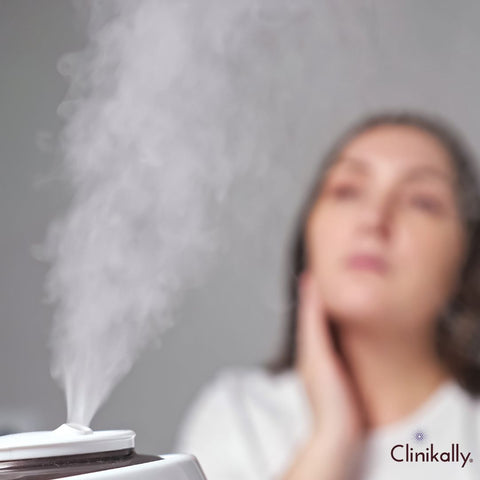
Humidifiers can help maintain skin moisture, especially in dry environments. Here's how humidifiers can improve skin health:
-
Increases Moisture Levels: Humidifiers add moisture to the air, keeping it from becoming too dry. Dry air can remove moisture from the skin, causing dryness, flakiness, and irritation. By maintaining optimal humidity levels in your home, humidifiers help keep the skin hydrated and supple.
-
Relieves Dry Skin: Eczema, psoriasis, and dermatitis are among the dry skin conditions that can be made worse by dry air, especially in dry climates or during the winter. By restoring moisture to the air and halting the loss of moisture from the skin's surface, humidifiers help relieve dryness and calm irritated skin.
-
Promotes Healing: Dry, chapped, or irritated skin can heal more quickly when exposed to moisturising air or moisture. Humidifiers lessen discomfort and encourage skin recovery by increasing humidity, which supports the skin's natural healing processes.
-
Prevents Premature Ageing: Dry air causes the skin to lose elasticity and moisture, which can lead to premature ageing of the skin. This may eventually cause sagging skin, wrinkles, and fine lines to appear. Humidifiers help keep skin hydrated, plump, and youthful-looking by ensuring proper moisture levels.
-
Enhances Skin Conditions: By lowering dryness, itching, and inflammation, humidifiers can help people with long-term skin conditions like rosacea, psoriasis, and eczema. Humidifiers provide a more humid atmosphere, which helps reduce symptoms and enhances skin comfort in general.
Enhancing Skin Health: Prevention and Maintenance

Skin health is improved through a combination of preventive measures and ongoing maintenance. Here are some essential strategies for promoting healthy skin:
-
Use sunscreen daily to shield your skin from the damaging effects of UV radiation. Choose a broad-spectrum sunscreen with an SPF of 30 or higher and reapply every two hours, especially if you are outside or have been swimming or sweating. Also, seek shade, wear protective clothing, and avoid prolonged sun exposure, especially during peak hours (10 a.m. to 4 p.m.).
-
Eat a well-balanced diet that includes fruits, vegetables, whole grains, lean proteins, and healthy fats. Foods high in antioxidants, vitamins, and minerals nourish your skin from within and aid in its natural healing processes. Drink plenty of water throughout the day to keep your skin hydrated and elastic.
-
Cleanse your skin every day to remove dirt, oil, and impurities, but avoid over-washing or using harsh cleansers, which can strip natural oils and disrupt the skin's barrier function. Use a gentle, pH-balanced cleanser appropriate for your skin type, and avoid using hot water, which can further dry out the skin.
-
Keep your skin hydrated by using a moisturiser that is appropriate for your skin type. Moisturisers help the skin retain moisture, prevent water loss, and maintain its natural barrier function. Apply a moisturiser to damp skin after bathing or showering to effectively seal in moisture.
-
Exfoliation can help remove dead skin cells, unclog pores, and promote cell turnover. Apply a gentle exfoliant 1-3 times per week, depending on your skin's tolerance and requirements. Avoid exfoliating too much, which can irritate the skin and compromise its protective barrier.
-
Maintain a healthy lifestyle by engaging in regular physical activity, managing stress, getting enough sleep, and avoiding smoking and excessive alcohol consumption. Exercise increases blood circulation, lowers stress hormones, and promotes skin health, whereas stress management techniques help prevent stress-related skin problems such as acne and eczema.
-
Wear protective clothing, such as wide-brimmed hats, sunglasses, and long sleeves, to protect your skin from environmental aggressors like the sun, pollution, and harsh weather conditions. Choose UPF-rated fabrics for added sun protection.
-
Schedule regular skin check-ups with a dermatologist to monitor your skin's health, detect changes or abnormalities early on, and receive personalised skincare and preventive recommendations.
By incorporating these preventive and maintenance strategies into your daily routine, you can promote healthy, radiant skin while reducing the risk of skin problems and premature ageing. Remember that consistency and patience are essential, and it is never too late to begin taking care of your skin.









































